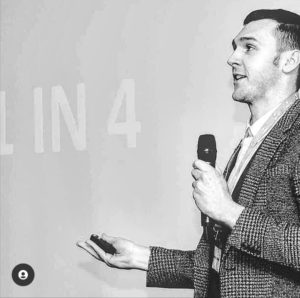SHP speaks to Thomas Dunning, Mental Health Runner Director, who was named SHP’s Trailblazer in Positive Social Impact, back in December.
 Thomas has worked at British Sugar since 2009. After completing his mechanical engineering apprenticeship and achieving his HND, he moved into a Process Technician role from 2012. Outside of his day job, he devotes most of his time to help improve the mental health of others as ‘Mental Health Runner’.
Thomas has worked at British Sugar since 2009. After completing his mechanical engineering apprenticeship and achieving his HND, he moved into a Process Technician role from 2012. Outside of his day job, he devotes most of his time to help improve the mental health of others as ‘Mental Health Runner’.
Thomas has been diagnosed with borderline personality disorder, social anxiety disorder and PTSD. They all stem from a mixture of different events from Thomas’ life. “The PTSD and the social anxiety were triggered when my brother sadly passed away in 2009, but it all stems back to my childhood, where I was bullied quite heavily throughout my school life. It wasn’t a very nice time. At home, fantastic, but soon as I left the front door I’d have to sprint and hide away from people, it was quite horrific.”
The other one is called a borderline personality disorder, or BPD, which can affect people in different ways. The way it affects Thomas is that his emotions are on a knife edge. If he’s having a good day, he feels like he is having a positive impact on those around him. But, on a bad day, he feels like he has upset people around him.
Scroll to the bottom of this page, to listen to this interview in full.
Mental Health Runner

Thomas accidentally found out how running helps with mental health – being in a world where he was hearing and seeing things, psychotic rages and countless attempted suicides, running would be a main contributor to saving his life. He is an international keynote and TED speaker who shares his mental health journey explicitly to show the world that it really is “okay to not be okay”.
“I was actually just looking around at TED talks, and there’s a couple which got me through when I was in my worst part of my mental health. I realised that talking about my mental health was quite a powerful subject, not just for one person who may be suffering with it, but it’s also quite empowering for someone else who may be suffering in silence.”
Thomas set up a blog about mental health. “It was just me talking about my mental health issues, my diagnosis, what I’m struggling with how it affects me, but also how running is a massive help for your mental health and wellbeing. That’s where Mental Health Runner started. I wanted to help people get active, help people want to use something else, almost like a holistic approach, to help their mental health. It’s free, it’s something easy, anyone can be active. It’s just grown and expanded from there.”
Trailblazer
The SHP Awards judges were impressed with how Thomas has turned a negative into a positive and opened the subject of mental health up to a much wider audience. He said it felt ‘incredible’ to be named the winner of the award.
“This is just something that I took up because I’m passionate about it. I’m passionate about my actual career as well, but I’m hugely passionate about mental health and destigmatising it. Even being shortlisted made me feel like everything I’m doing is good. When I found out I’d won, I was in pieces, I couldn’t believe it.”
Speaking out
Encouraging people to open up and speak out about their own experiences is something Thomas is very keen on, but I was keen to find out how much it has helped him, personally. “There is something cathartic about it the fact that I’m just telling people about what happened to me. The way that I see it is that, when I was in the bad parts of the mental health situation, I was off work for a year. The fact that I can now openly talk about my mental health issues on a global scale is a type of therapy, because it makes me realise that normal and people want to hear your story. But it also me makes me realise that I was there once, listening to other people’s stories and how important it is that we talk. There’s always going to be someone who will want to listen. Whether you think they’re listening or not, it’s so powerful for yourself to say ‘look, I’m not feeling too great’.
Thomas said it’s that being able to say those words is an acceptance that there is something not quite right and that’s the first step to getting some professional help.
“You should never be ashamed; you should never feel stigmatised about what you’re going through. I was my worst enemy. I stigmatised myself. I thought I was a danger to people at one point and I didn’t leave the house because of it. But, you know, you’re not, you just go through an extremely hard time, and you will get through it.”
The fight for survival in a war against yourself: Watch Thomas’ TED Talk, here.
Support from work
Thomas admits that, at the time of his diagnosis, there wasn’t a great deal known about mental health in the workplace and that the situation has changed significantly in the years since. But even so, his employer, British Sugar, was a great support to him. “Mental health is now on the mantle of people’s company agenda. At the time there were not any Mental Health First Aiders on site but now, with their support, I’ve helped British Sugar sign up to the mental health at work commitment.
“The have been so supportive. The factory manager suggested I speak to the board of directors on it and, from there, we’ve started a mental health committee, we have Mental Health First Aiders on all sites around the country. They’ve been incredible.”
It was this ‘devotion to improve the mental health of others’, that also stood out to the SHP Awards judges.
“In my spare time, on my days off, I attend the committee meetings, just because it’s something I’m passionate about, and if it helps me and it helps other people, then everyone’s a winner.
“It felt incredible the fact that the board approached me and it’s great to see that company has said, ‘we are going to look after our mental health and staff and make sure everyone ever feels safe.’ If the company can look after their staff, fantastic, but if we can promote that the business is looking after their staff and we’re out there saying, ‘this is us doing what we can’, for me it’s a win-win. The staff feel supported, and the rest of the world knows that British Sugar is looking after its staff.
Improving workplace health and wellbeing
Often with these things, there is a perception that it’s expensive or tough to implement. Thomas says that’s not at all accurate. He advises that a good starting point, is to do a survey. “It’s completely free and hassle free. Often companies don’t know the concerns of their staff, simply because they have not asked, or have been scared to find out. Find out what the staff need and if they feel they are being supported. You might be shocked when you find out the results, you might be doing something that’s really bad that’s easy to fix, or, you might be doing the right stuff, but are just not publicising it enough internally.”
Safety & Health Podcast
Hear SHP’s interview with Thomas and find out how the perceived negative of struggles with mental ill-heath, can be turned into a positive.
Subscribe and tune in the Safety & Health Podcast to discover the latest issues facing the health and safety profession, and stay on-top of the developments affecting your role, from working at height, lone working and common workplace hazards, to safety culture, behaviours, occupational health and mental health and wellbeing.


Seems to be a problem with playing podcast recording
Hi Philip, thanks for pointing that out. Should all be fixed now. Regards, Ian.